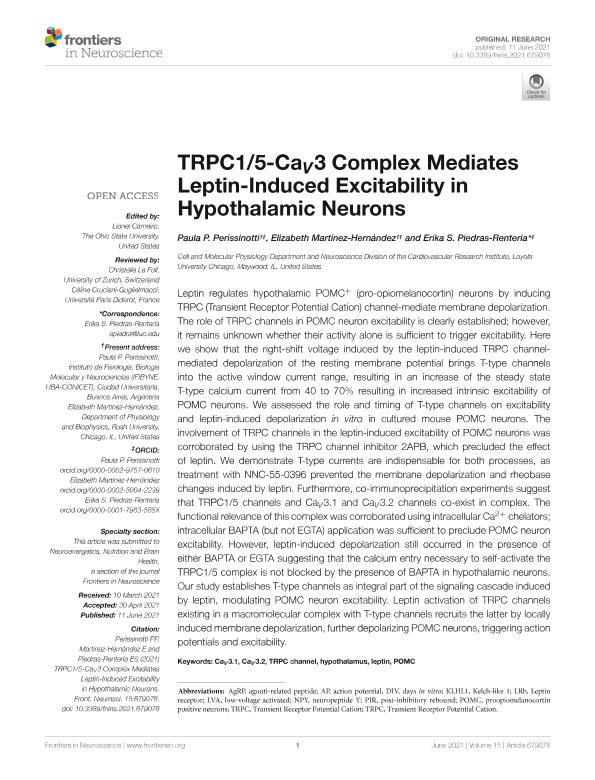Mostrar el registro sencillo del ítem
dc.contributor.author
Perissinotti, Paula Patricia

dc.contributor.author
Martínez Hernández, Elizabeth
dc.contributor.author
Piedras Rentería, Erika S.
dc.date.available
2022-10-28T12:27:29Z
dc.date.issued
2021-06
dc.identifier.citation
Perissinotti, Paula Patricia; Martínez Hernández, Elizabeth; Piedras Rentería, Erika S.; TRPC1/5-CaV3 Complex Mediates Leptin-Induced Excitability in Hypothalamic Neurons; Frontiers Media; Frontiers in Neuroscience; 15; 6-2021; 1-14
dc.identifier.issn
1662-453X
dc.identifier.uri
http://hdl.handle.net/11336/175312
dc.description.abstract
Leptin regulates hypothalamic POMC+ (pro-opiomelanocortin) neurons by inducing TRPC (Transient Receptor Potential Cation) channel-mediate membrane depolarization. The role of TRPC channels in POMC neuron excitability is clearly established; however, it remains unknown whether their activity alone is sufficient to trigger excitability. Here we show that the right-shift voltage induced by the leptin-induced TRPC channel-mediated depolarization of the resting membrane potential brings T-type channels into the active window current range, resulting in an increase of the steady state T-type calcium current from 40 to 70% resulting in increased intrinsic excitability of POMC neurons. We assessed the role and timing of T-type channels on excitability and leptin-induced depolarization in vitro in cultured mouse POMC neurons. The involvement of TRPC channels in the leptin-induced excitability of POMC neurons was corroborated by using the TRPC channel inhibitor 2APB, which precluded the effect of leptin. We demonstrate T-type currents are indispensable for both processes, as treatment with NNC-55-0396 prevented the membrane depolarization and rheobase changes induced by leptin. Furthermore, co-immunoprecipitation experiments suggest that TRPC1/5 channels and CaV3.1 and CaV3.2 channels co-exist in complex. The functional relevance of this complex was corroborated using intracellular Ca2+ chelators; intracellular BAPTA (but not EGTA) application was sufficient to preclude POMC neuron excitability. However, leptin-induced depolarization still occurred in the presence of either BAPTA or EGTA suggesting that the calcium entry necessary to self-activate the TRPC1/5 complex is not blocked by the presence of BAPTA in hypothalamic neurons. Our study establishes T-type channels as integral part of the signaling cascade induced by leptin, modulating POMC neuron excitability. Leptin activation of TRPC channels existing in a macromolecular complex with T-type channels recruits the latter by locally induced membrane depolarization, further depolarizing POMC neurons, triggering action potentials and excitability.
dc.format
application/pdf
dc.language.iso
eng
dc.publisher
Frontiers Media

dc.rights
info:eu-repo/semantics/openAccess
dc.rights.uri
https://creativecommons.org/licenses/by/2.5/ar/
dc.subject
CAV3.1
dc.subject
CAV3.2
dc.subject
HYPOTHALAMUS
dc.subject
LEPTIN
dc.subject
POMC
dc.subject
TRPC CHANNEL
dc.subject.classification
Neurociencias

dc.subject.classification
Medicina Básica

dc.subject.classification
CIENCIAS MÉDICAS Y DE LA SALUD

dc.title
TRPC1/5-CaV3 Complex Mediates Leptin-Induced Excitability in Hypothalamic Neurons
dc.type
info:eu-repo/semantics/article
dc.type
info:ar-repo/semantics/artículo
dc.type
info:eu-repo/semantics/publishedVersion
dc.date.updated
2022-09-23T14:25:56Z
dc.journal.volume
15
dc.journal.pagination
1-14
dc.journal.pais
Suiza

dc.description.fil
Fil: Perissinotti, Paula Patricia. Consejo Nacional de Investigaciones Científicas y Técnicas. Oficina de Coordinación Administrativa Ciudad Universitaria. Instituto de Fisiología, Biología Molecular y Neurociencias. Universidad de Buenos Aires. Facultad de Ciencias Exactas y Naturales. Instituto de Fisiología, Biología Molecular y Neurociencias; Argentina
dc.description.fil
Fil: Martínez Hernández, Elizabeth. Loyola University Of Chicago; Estados Unidos
dc.description.fil
Fil: Piedras Rentería, Erika S.. Loyola University Of Chicago; Estados Unidos
dc.journal.title
Frontiers in Neuroscience
dc.relation.alternativeid
info:eu-repo/semantics/altIdentifier/doi/http://dx.doi.org/10.3389/fnins.2021.679078
Archivos asociados
